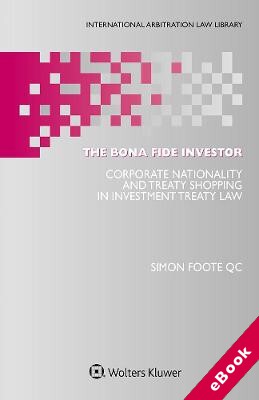
The device(s) you use to access the eBook content must be authorized with an Adobe ID before you download the product otherwise it will fail to register correctly.
For further information see https://www.wildy.com/ebook-formats
Once the order is confirmed an automated e-mail will be sent to you to allow you to download the eBook.
All eBooks are supplied firm sale and cannot be returned. If you believe there is a fault with your eBook then contact us on ebooks@wildy.com and we will help in resolving the issue. This does not affect your statutory rights.
The Bona Fide Investor is a comprehensive review of the concept of treaty shopping and how it is facilitated by investment treaty criteria for corporate nationality. Many corporations engage in treaty shopping or ‘nationality planning’ to procure investment treaty protection by attaining a nationality of convenience. This book is the first in-depth exploration of a substantive legal basis by which to assess the bona fides of a corporate investor’s nationality: an interpretative approach that looks to the purpose of a claimant’s existence in the ownership structure of an investment is the correct jurisprudential answer to the problem of treaty shopping by manipulating corporate nationality in investment treaty law.
In a comprehensive review of the concept of treaty shopping, the author examines the degree to which manipulation of corporate nationality is consistent with the objects and purposes of the investment treaty regime and analyses its effect on the legitimacy of investor-state dispute mechanisms. Then, to evaluate a substantive test for a bona fide investor, the book examines analogous areas of international law such as the law of diplomatic protection and double tax treaties, and reviews in detail the relevance in investment treaty law of such pertinent issues and topics as:
The effectiveness of substantive criteria presently used to mitigate illegitimate or undesirable treaty shopping are examined and compared with the ‘purpose to exist’ test, and the prospective legal mechanisms that may be utilised to implement a substantive approach are canvassed in detail.
This incomparable book brings coherence to the debate about the attribution and use of nationality by corporations in the field of investment treaty law. It will be of immense interest and use to practitioners who advise on investment treaty jurisdictional issues for clients (whether states or investors) and debate jurisdictional concepts and corporate nationality issues before international tribunals. It significantly advances academic thought on the issue of corporate treaty shopping in investment treaty law, and it will be a useful resource, as well as a challenge, to arbitrators regarding the extent to which investment treaty tribunals tolerate manipulation of corporate nationality and circumscribe jurisdiction to protect the legitimacy of the investment treaty system.